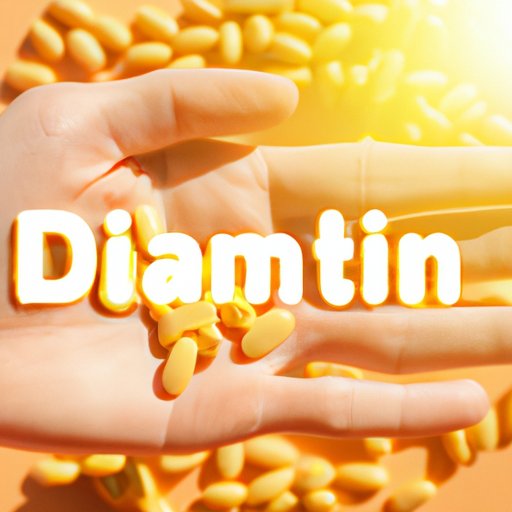I. Introduction
Vitamin D is essential for maintaining overall health and wellbeing. It plays a critical role in bone health, immune function, and maintaining a healthy mind. However, recent research has highlighted the alarming trend of vitamin D deficiency across populations, making it a growing health concern. This article explores the importance of vitamin D, its benefits, and solutions to mitigate deficiency.
II. The Sunshine Vitamin: Why Vitamin D is Crucial for Your Health
Vitamin D is a fat-soluble vitamin that your body produces when exposed to sunlight. It is also found in some food sources and supplements. Vitamin D helps your body absorb calcium and phosphorus, essential for healthy bones. It also plays a critical role in maintaining a healthy immune system and regulating mood.
When the skin is exposed to sunlight, it triggers the natural production of vitamin D. The amount of sunlight needed varies depending on the individual’s skin tone, location, and time of day. A few minutes of unprotected sun exposure a day can contribute to the recommended daily intake of vitamin D.
III. Building Strong Bones and Beyond: Exploring the Benefits of Vitamin D
One of the most well-known benefits of vitamin D is its role in maintaining strong and healthy bones. Vitamin D aids in the absorption of calcium, which is crucial for building and maintaining healthy bones. Adequate vitamin D intake has been shown to reduce the risk of fractures and falls in older adults.
However, vitamin D is not just important for bone health. Research has shown that adequate vitamin D levels may also reduce the risk of heart disease, type 2 diabetes, and certain cancers. It also plays a crucial role in cognitive function and mental health, with studies linking vitamin D deficiency to depression and anxiety.
The benefits of vitamin D are supported by research studies. A cohort study found that individuals with adequate vitamin D levels had a 30% reduced risk of colorectal cancer compared to those with deficient levels. Another study reported that supplementing with vitamin D can reduce the risk of falls in older adults by up to 24%.
IV. Vitamin D Deficiency: Symptoms and Solutions to a Growing Health Concern
Vitamin D deficiency is becoming increasingly common and can put individuals at risk of various health problems. Symptoms of deficiency include fatigue, bone pain, muscle weakness, and an increased risk of fractures. People who live in northern latitudes, receive limited sun exposure, have darker skin tones, or follow a vegan or vegetarian diet are more likely to be deficient.
A blood test can diagnose vitamin D deficiency. Treatment usually involves increasing sun exposure, supplementing with vitamin D, or incorporating more vitamin D-rich foods into the diet. The recommended intake for vitamin D varies depending on age, sex, and other factors – adults under 70 need at least 600 IU (International Units) of vitamin D per day.
V. From Immune Booster to Mood Regulator: The Multiple Roles of Vitamin D
Vitamin D plays diverse roles in the body beyond maintaining healthy bones. It supports a strong immune system by promoting the production of antimicrobial peptides that help your body fight off infections and diseases. Studies have shown that vitamin D deficiency can increase your risk of respiratory infections and autoimmune diseases like multiple sclerosis.
Vitamin D is a crucial regulator of mood and mental health. It helps regulate serotonin levels, a neurotransmitter that affects mood. Low levels of serotonin are linked to depression and seasonal affective disorder (SAD). Exposure to sunlight and supplementing with vitamin D can improve symptoms of SAD.
VI. Top Sources of Vitamin D and Why You Should Include Them in Your Diet
Vitamin D is not found naturally in many foods. However, some foods are fortified with vitamin D, and certain dietary sources are high in vitamin D. Fatty fish, such as salmon and mackerel, are some of the most excellent sources of vitamin D. Egg yolks, cheese, and certain mushrooms also contain vitamin D.
Incorporating foods that contain vitamin D into your diet is important. However, it can be challenging to get adequate amounts of vitamin D through diet alone. Sunlight exposure is a natural and easy way to get vitamin D- a few minutes of unprotected sun exposure a day can contribute to the recommended daily intake of vitamin D. Vitamin D supplements can also ensure adequate intake, especially for those who are deficient or have limited sun exposure.
VII. Conclusion
Vitamin D is an essential nutrient for overall health and wellbeing. Its benefits range from maintaining strong bones to regulating mood and immunity. Vitamin D deficiency is a growing health concern, and it’s essential to take adequate measures to ensure healthy vitamin D levels. Incorporating vitamin D from dietary sources, sunlight exposure, and supplements is key to optimizing vitamin D levels for optimal health. It’s time to take action to ensure that you’re getting enough vitamin D for your overall wellbeing and quality of life.
